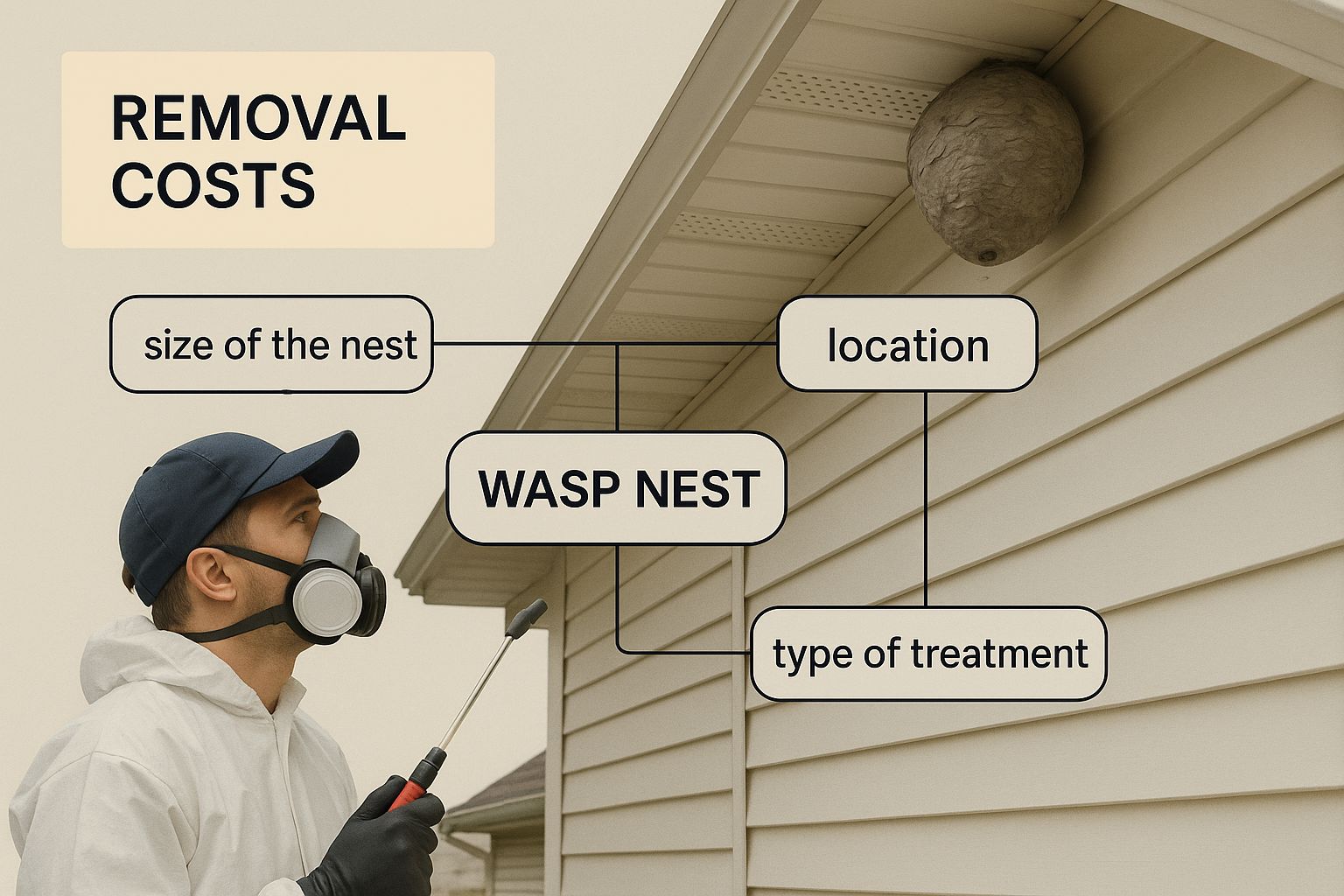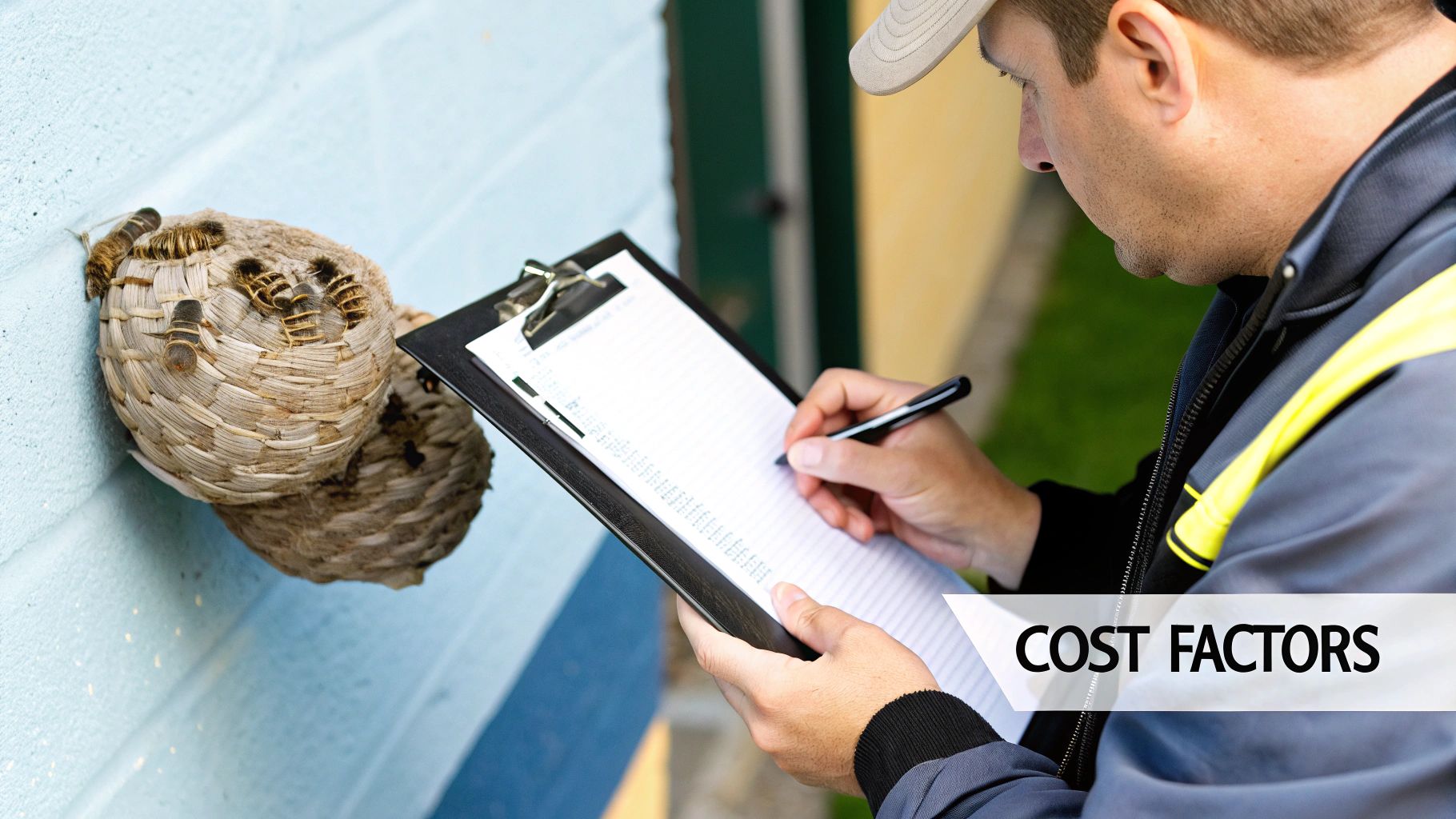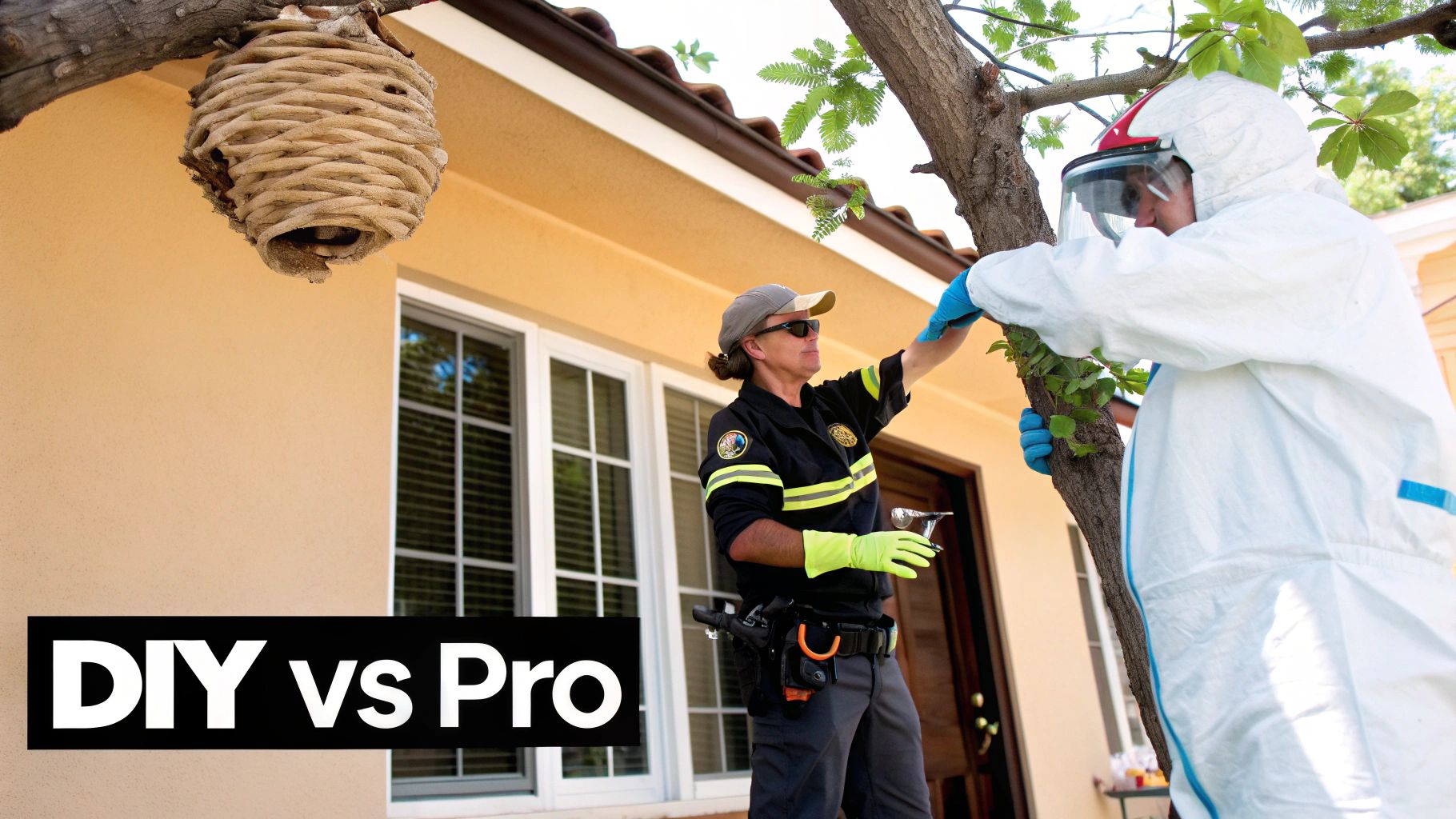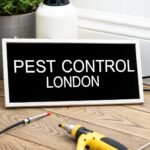So, you've found a wasp nest. Your first thought is probably, "How much is this going to cost to get rid of?"
The short answer is that the average wasp nest removal cost in the UK usually lands somewhere between £70 and £150 for a single, easy-to-reach nest. But that’s just a starting point. The final bill can climb depending on where the nest is and how tricky the job is to tackle.
Understanding Wasp Removal Price Ranges
Think of it like calling out a plumber. A simple job like fixing a dripping tap is one price, but sorting out a hidden leak that’s buried deep inside a wall? That’s a whole different ball game. The same logic applies here.
A small, visible nest tucked under the eaves of your shed is a straightforward job for a pro. But a huge, well-established colony that’s made its home deep inside your loft insulation or within a wall cavity? That’s going to take more time, specialised equipment, and involves a much bigger risk for the technician. Naturally, the price will reflect that.
To give you a clearer picture, let's break down the typical costs you might see.
UK Wasp Nest Removal Price Snapshot
This table gives a general idea of what to expect when you get a quote. It shows how the price isn't a single, fixed figure but a spectrum that depends on the situation.
| Service Type | Typical Cost Range | Average Price |
|---|---|---|
| Single Accessible Nest | £60 – £90 | £75 |
| Nest in a Difficult Location (e.g., loft) | £90 – £150 | £120 |
| Multiple Nests (per additional nest) | £20 – £40 | £30 |
| Emergency or Weekend Call-Out | £120 – £200+ | £160 |
As you can see, the wasp nest removal cost can vary quite a bit. Knowing this helps you set a realistic budget before you even pick up the phone. Next, we’ll dive into the specific factors that determine exactly where your job will fall on this scale.
Key Factors That Influence Removal Costs
So, why isn’t there a single, flat fee for getting rid of a wasp nest? The final price tag is a blend of several factors, much like a recipe where each ingredient changes the final flavour. The wasp nest removal cost is rarely a one-size-fits-all figure because every situation throws a unique challenge at the technician.
A huge driver of the cost is simply where the nest is. Think of it like a hidden plumbing leak versus a dripping tap. A nest that’s easy to get to on a low-hanging branch is pretty straightforward. But a nest tucked away inside a wall cavity, high up in a loft, or deep within a chimney? That’s a whole different story. It requires more expertise, specialised equipment, and a lot more time to sort out safely, which naturally pushes the price up.
This image gives you a good idea of how different factors, like the nest's location, can affect the overall bill.

As you can see, a technician has to weigh up multiple things, from how easy it is to reach the nest to the risks involved, before giving you a final quote.
The Impact of Size and Urgency
The size of the nest and how many you have also play a massive role. A small, new nest found early in the season is a much simpler fix than a giant, well-established colony buzzing with thousands of angry wasps. If you’ve got multiple nests on your property, each extra one will add to the total cost, though usually at a slightly lower rate than the first.
On top of that, how quickly you need the job done matters. An emergency call-out on a bank holiday or a weekend will almost always come with a premium charge. It just comes down to the higher labour costs involved for out-of-hours work.
Understanding Professional Pricing Structures
To get a better handle on what goes into your final bill, it helps to look at how other home service professionals figure out their rates. For example, looking at how service providers determine their pricing for jobs that also involve labour, materials, and risk assessment can be insightful.
Pest control pricing follows a similar logic. It's all about balancing these core components to come up with a fair quote for the specific job at hand.
Breaking Down a Typical Removal Quote

When you get a quote for wasp nest removal, you’re paying for far more than just a quick spray. The final bill is actually a careful calculation of expertise, risk, and the resources needed to do the job safely and effectively. Understanding what goes into that number helps you see the real value and ensures there are no nasty surprises down the line.
The first thing you'll usually see is a call-out fee. This covers the basics—the technician's travel time, fuel, and the initial expert assessment of what they’re up against. It’s the baseline cost for getting a trained professional to your doorstep.
From there, the quote is built around the specific challenges of your situation.
Core Service Charges
The bulk of your bill comes down to two things: labour and materials. Labour covers the technician's time on-site, which is massively influenced by how tricky the nest is to get to and treat.
At the same time, the materials themselves play a big role. We use specialised, high-strength insecticides that you simply can't buy in a shop. These are potent chemicals that need to be handled with extreme care, and their cost is factored directly into the quote.
A professional quote isn't just a number; it's a breakdown of safety, efficiency, and guaranteed results. It reflects the cost of using the right tools and expertise to solve the problem correctly the first time.
Here in the UK, a standard job typically falls somewhere between £71 and £241, with the average coming in at around £156. The price you pay will depend on things like the nest's location and how easy it is to access. For instance, costs in major hubs like London can be up to 50% higher than in smaller towns, simply due to higher operating costs. To get a better feel for the market, you can find more detail on how these regional prices and wasp nest removal costs are calculated.
Potential Surcharges and Guarantees
But what if the job isn't straightforward? That's where you might see surcharges. These are extra fees for circumstances that go beyond a standard removal.
Common surcharges pop up for things like:
- Difficult Access: If we need special gear like extended ladders or scaffolding to reach a nest tucked high up on a roofline or inside a chimney.
- Multiple Nests: The first nest carries the main cost, but each extra one will usually add a smaller fee, often between £20 and £40.
- Structural Work: In the rare case a nest is buried inside a wall, we might need to do some minor cutting into plasterboard to treat it, which can add to the labour time.
Finally, any good quote will include a guarantee. This is our promise to you. If wasps return to the treated nest within a set period, we’ll come back for a follow-up visit at no extra charge. This peace of mind is the hallmark of a reputable pest control service and ensures your home isn't just treated, but properly protected.
Weighing Professional Service Against DIY Risks

Tackling a wasp nest yourself can seem like a clever way to save a few quid. A quick trip to the hardware shop for a can of insecticide foam feels far cheaper than calling in a professional, right? But that initial saving is often deceptive, hiding a whole range of hidden costs and serious dangers that can quickly turn a budget fix into an expensive—and painful—ordeal.
The true wasp nest removal cost isn't just about the price of a spray can. It's really about weighing the value of safety, effectiveness, and your own peace of mind against a small upfront saving. A botched DIY attempt can easily lead to multiple stings, property damage from dodgy chemical use, or simply failing to get the whole colony. And then you're forced to call in a professional anyway, having spent money for nothing.
Comparing Costs Directly
Let's break down the numbers. A professional visit usually comes with a fixed fee that covers everything from start to finish. Looking at data from UK pest controllers, the average cost for a single visit is around £70, with most jobs falling somewhere between £50 and £100. That fee includes the technician’s time and expertise, professional-grade insecticides you can't buy in shops, and the guarantee of a job done right.
Now, let's look at the DIY route.
- Wasp-killing foam or powder: £10 – £20
- Protective clothing (often inadequate): £20 – £40
- Potential for multiple treatments: Another £10 – £20
While the DIY kit seems cheaper at first glance, tallying up to around £30-£60, it comes with absolutely no guarantee of success and a very real personal risk.
The Overlooked Risks of DIY Removal
Safety is the biggest factor that tips the scales in favour of professional help. If you disturb a nest without the right training or gear, you can provoke a swarm in seconds, and unlike bees, wasps can sting repeatedly. For anyone with allergies, this can be genuinely life-threatening. When considering a DIY approach, it's absolutely crucial to prioritise your safety by understanding personal protective equipment requirements to shield yourself from both stings and chemicals.
A professional service doesn’t just eliminate the nest; it removes the risk. You are paying for an expert to safely handle a dangerous situation, ensuring the problem is solved without putting you or your family in harm's way.
Ultimately, the decision comes down to risk versus reward. While saving £20 might seem appealing, the potential for injury or a failed removal often makes professional service the more sensible and, in the long run, cost-effective choice. It's also vital to know what you're dealing with; you can explore our guide on https://www.pestpredatorslimited.co.uk/wasps-bees-what-you-need-to-know-and-when-to-call-the-pros/ for more clarity.
How Location Impacts Your Removal Bill
Just like the price of a house can vary wildly from one part of the country to another, the wasp nest removal cost is heavily influenced by your postcode. Where you live in the UK plays a massive role in the final figure you'll see on the bill, turning what seems like a standard service into one with some pretty noticeable regional price differences.
Think of it this way: the day-to-day running costs for a business in central London are a world away from those in a quiet rural town. Higher rent, wages, and even things like congestion charges all add up, forcing services in major cities to be more expensive. Pest control is no exception.
The Urban Versus Rural Divide
If you’re in a large city like London, Manchester, or Birmingham, you can almost always expect to pay a premium. The demand for services shoots up during peak season, and when you combine that with higher business overheads, removal services can end up being anywhere from 20% to 40% more expensive than the national average. Technicians simply have to charge more to cover their own costs.
This often creates a clear pricing gap between built-up urban areas and the countryside.
A job that costs £70 in a smaller town could easily command £100 or more in a major city, even if the nest's size and location are identical. That difference is almost entirely down to the local economy.
On the flip side, if you live somewhere more rural or suburban, you might find the initial quotes are a bit easier on the wallet. With less competition and lower running costs, local pest controllers can often offer a more budget-friendly starting rate.
To give you a clearer idea of how this plays out across the country, here’s a look at some average costs in different UK cities.
Regional Price Comparison for Wasp Nest Removal
| City | Average Cost | % Above Median |
|---|---|---|
| London | £110 – £140 | 35-45% |
| Manchester | £85 – £105 | 20-30% |
| Birmingham | £80 – £100 | 15-25% |
| Bristol | £75 – £95 | 10-20% |
| Glasgow | £70 – £90 | 5-15% |
| Cardiff | £65 – £85 | 0-10% |
As you can see, the price difference is significant. A London postcode almost guarantees a higher bill compared to one in Cardiff, purely because of the economic factors at play.
Don't Forget About Travel and Accessibility Charges
Living out in a remote area isn't always a guaranteed saving, though. While the base fee for the job may well be lower, you might get hit with additional travel surcharges. If a technician has a long drive to get to your property, they’ll likely add a fee to cover their fuel and time on the road.
This is standard practice for most service businesses that cover large territories. It’s always a good idea to ask if your quote includes all travel costs, especially if you know you’re a fair distance from the company's main base of operations.
For a more detailed look at how all these different factors come together, check out our full guide on understanding pest control prices near you. It will help you get a much clearer picture of what to expect based on your specific situation.
Smart Ways to Keep Removal Costs Down
While getting a professional in to deal with a wasp nest is a smart investment in your safety, it doesn't have to break the bank. With a little bit of forward-thinking, you can significantly lower the final wasp nest removal cost and stop future problems before they even start. It’s all about being proactive.
One of the best things you can do is act early. A wasp nest in April or May is a world away from one you find in August. Early in the season, the nest is often no bigger than a golf ball and home to just the queen and her first few workers. That makes the removal job far quicker, simpler, and cheaper.
Get into the habit of having a quick look around your property every now and then—check sheds, lofts, under the eaves, and other favourite wasp hotspots. Catching a small nest early can save you from a much bigger bill later in the summer.
Bundling Services and Getting a Fixed Price
Another clever move is to think about any other pest issues you might have. Lots of companies will offer a discount if you bundle services together. If you've also seen signs of ants or you're due for your yearly rodent check, it's worth asking about a package deal. It's more efficient for the technician to sort everything in one visit, and those savings are often passed on to you.
When you ring around for quotes, always push for a fixed price.
A fixed-price quote locks in the cost and protects you from any nasty surprises. It means the price you’re told is the price you pay, even if the job ends up being trickier than expected due to difficult access or other complications.
This simple step gives you clarity and helps you budget properly, ensuring the wasp nest removal cost doesn't creep up.
Long-Term Prevention is the Best Saving of All
Ultimately, the best way to save money is to not need a removal service in the first place. Once this year's nest is gone, take a few simple steps to prepare for the next.
- Seal Up Entry Points: Have a good look for any small cracks or gaps on the outside of your home, paying close attention to eaves, window frames, and vents where a queen might sneak in to build a nest.
- Keep Your Garden Tidy: Make sure your bins are sealed, clear up fallen fruit, and manage your compost heap. Wasps are drawn to easy food sources, so making your garden less inviting can encourage them to move on.
- Try Decoy Nests: Wasps are territorial creatures. Hanging a couple of fake nests around your property can sometimes fool a new queen into thinking the area is already taken, convincing her to look elsewhere.
These small, proactive measures can make your property a much less appealing spot for wasps, saving you a whole lot of hassle and money down the line.
Your Questions About Removal Costs, Answered
When you’re staring down a wasp nest, the last thing you want is confusion about pricing. To give you some peace of mind before you even pick up the phone, we’ve answered a few of the most common questions homeowners ask us about the wasp nest removal cost.
We get it – nobody likes surprise fees. Our aim here is to give you a clear picture of what to expect, so you can make a smart, confident decision.
Do I Have to Pay a Call-Out Fee?
Yes, most professional pest control companies will have a call-out fee. It’s best to think of this as the baseline cost for getting a trained, insured, and properly equipped technician to your front door. It covers their fuel, travel time, and the initial expert assessment of what’s going on.
This fee ensures the technician’s time and expertise are accounted for, even if the job itself is quick. In almost all cases, this cost is simply rolled into the final fixed-price quote you’re given for the full job.
A call-out fee is standard industry practice. It’s the starting block for the total cost, covering the logistics of getting a professional to you promptly and ready to work.
When Is Professional Removal a Must?
While tackling a tiny, visible nest at the very start of spring might seem tempting, there are several situations where calling a professional is non-negotiable. You should always bring in a pro if:
- The nest is in a tricky spot: Nests tucked away inside wall cavities, lofts, chimneys, or high up under the eaves demand specialised equipment and know-how.
- Someone in the house has allergies: For anyone with a wasp sting allergy, an encounter can be life-threatening. The risk is far too great to take on yourself.
- The nest is large: A well-established nest is a bustling city of thousands of wasps, and they will defend it aggressively. Disturbing it without professional gear is incredibly dangerous.
What Could Add Surprise Charges to My Bill?
The best way to sidestep unexpected costs is to get a fixed-price quote before any work begins. However, sometimes things pop up that weren't obvious during the initial phone call. For instance, discovering a second hidden nest during the treatment, or realising the nest is higher than first thought and needs special access equipment like a cherry picker.
To avoid any shocks, always ask your technician to confirm exactly what the quote includes. This helps ensure the final wasp nest removal cost has no unwelcome additions.
Ready to get that wasp problem sorted safely and for good? Contact Pest Predators Limited for a clear, fixed-price quote and expert service you can rely on. https://www.pestpredatorslimited.co.uk

